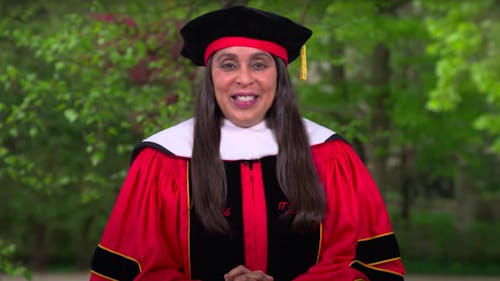Natasha Trethewey addresses Rutgers Class of 2021 graduates at commencement ceremony

Natasha Trethewey, an award-winning author and former U.S. Poet Laureate, addressed Class of 2021 graduates today at the Rutgers—New Brunswick and Rutgers Biomedical Health Sciences virtual commencement ceremony alongside University President Jonathan Holloway and other members of the Rutgers community.
At his first commencement as president of the University, Holloway said that although the past 15 months have been filled with unprecedented challenges and hardships, the Class of 2021 has persevered in order to make it where they are today.
"Through your hard work, your focus and your determination, you have found yourself here at the cusp of becoming," he said. "This may sound like an incomplete thought, 'the cusp of becoming what?' This is a question for you to answer and it is my hope that during your time at Rutgers you have developed the tools and sense of self that will propel you toward the first of what will likely be many different answers to that question in the years ahead."
Holloway also mentioned the importance of thanking those individuals who have helped graduates get to where they are today, the great responsibilities that come along with receiving a degree from Rutgers as well as the next stage of graduates' lives.
"To the Class of 2021, you have made it to this moment by surviving a series of trials that could not have been imagined," he said. "Now take full measure of those challenges and celebrate the fact that you have overcome them through your strength, creative vision and resilience. These attributes will serve you well as you become the embodiment of your dreams — congratulations graduates."
Trethewey began her address by highlighting the need for ceremonies during times of uncertainty. Whether they be in celebration or for more solemn occasions, she said these events can remind individuals of history and inspire hope for future possibilities.
"Because of all we’ve been through this last year, both collectively and individually, in this particular moment we are called to hull those two things side-by-side: the solemn and the celebratory,” she said.
Trethewey said these two things remind her of a poem called “When I am Asked” by Lisel Mueller, which explores the author’s journey to becoming a poet in the aftermath of suffering great personal losses.
Mueller’s poem discusses the indifference of nature in such times of personal loss and grief, where it continues to bloom and grow without acknowledging these losses, Trethewey said. After realizing this indifference, the author turns to the language of poetry and the human experience to comfort her in times of grief, she said.
Trethewey connects this notion not only to instances in her own life but also to the impactful events of the past year, such as the coronavirus disease (COVID-19) pandemic and mass protests against police brutality throughout the country.
“Nature is indeed indifferent, I thought, and indiscriminate, but the societal disparities that affect who is dying are not by nature, they are man-made,” she said.
She went on to compare the current instances of racism, hatred and white supremacy to the 1960s when she was born, reflecting on the history of her own family as well as the history of the U.S. as a whole. One particular anecdote shared by Trethewey included the the marriage story of her parents, an interracial couple who had to go against the law and travel outside their home state just to get married.
“With all the other advancements we’ve made since then as a nation, I did not expect to find us here, still unequal and more deeply divided in the midst of turmoil, collective resistance, peaceful protest and civil disobedience not seen in this country since the Civil Rights Movement,” she said. “We are again at such an inflection point — this time at the convergence of two difficult moments in our shared history.”
Trethewey also discussed the intersection of the heart and mind in the pursuit of knowledge, explaining how there is a “poetic quality” in all different areas of study. She described this intersection as a “manifestation of our most humane intelligence,” and stated that individuals must choose to not be indifferent like nature and must be consciously historical, a phrase coined by writer Adrienne Rich.
“With you, the graduating Class of 2021, who have been through so much, we have an opportunity to change the path from one of convenient forgetting and willed amnesia, which is a kind of indifference, to one of reckoning and remembering in order to contend with our past and shape our future,” she said.



